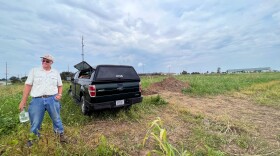-
In late June, smoke from Canadian wildfires blanketed the Miami Valley and most of the Midwest. The air quality index reached over 220 — unhealthy for most people. But there’s also some direct effects for Ohio cash crops like soy and corn.
-
Both the local air quality alerts and smoky skies are due to the wildfires blazing near Quebec, Canada.
-
Senate Bill 83 is scheduled for a second hearing today (Wednesday, March 29) at the statehouse in Columbus
-
Ohio is home to a delicious, native fruit that many have never heard of, or even tasted. The pawpaw has more vitamin C than an orange and it tastes–well, it’s hard to describe–but most people think it’s somewhere in the ballpark of a pineapple, mango, or kiwi.
-
Local company Woolpert received a fifty million dollar contract from the US Army Corps of Engineers. The Dayton geospatial firm will use the money to help government agencies map the entire coast of the continental United States, as well as Alaska and Hawaii.
-
Ohio has over 10 million acres of crop land. For decades much of it has been over-plowed, sprayed with fertilizers and stripped of its nutrients. Although recently, more farmers have seen the economic benefit of shifting their practices and being part of the climate change solution.
-
One of the biggest topics at this week's annual Farm Science Review was carbon markets.
-
If the study’s modeling is correct, that means the region will have days in the summer where it feels like it's one hundred and twenty five degrees.
-
Environmental advocates in Ohio said the climate change measures in the federal Inflation Reduction Act are "historic" but others caution the impact it could have on other energy industries in the state.
-
The Secretary of the Interior, a member of Biden's cabinet, was here to discuss how Biden's infrastructure law will fund projects in Ohio.
-
Conservation has been the guiding principle of America’s National Parks. But climate change is undermining that mission. The National Park Service says ecological changes are happening so fast, and on so many fronts, park rangers may need to choose what to save and what to let go.
-
Ohio University Associate Professor of Atmospheric Science Dr. Jana Houser says annual weather effects from western wildfire could become the new normal in Ohio.
Play Live Radio
Next Up:
0:00
0:00
Available On Air Stations











![High, muddy floodwaters of the Cuyahoga River at the Vaughn Road/Highland Road crossing. [Cuyahoga Valley National Park]](https://npr.brightspotcdn.com/dims4/default/e8ab04c/2147483647/strip/true/crop/1600x891+0+154/resize/280x156!/quality/90/?url=https%3A%2F%2Fideastream-production.s3.amazonaws.com%2Fuploads%2F2021%2F9%2F21%2FHighland%20Rd%20Bridge.jpg)